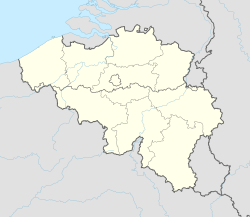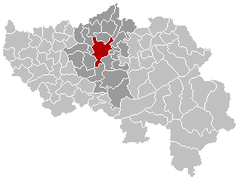Liège
Liège
Lîdje (Walloon) | |
|---|---|
 | |
| Coordinates: 50°38′N 05°34′E / 50.633°N 5.567°E | |
| Country | Belgium |
| Community | French Community |
| Region | Wallonia |
| Province | Liège |
| Arrondissement | Liège |
| Government | |
| • Mayor | Willy Demeyer (PS) |
| • Governing party/ies | PS – cdH |
| Area | |
| • Total | 68.65 km2 (26.51 sq mi) |
| Population (2018-01-01)[1] | |
| • Total | 197,355 |
| • Density | 2,900/km2 (7,400/sq mi) |
| Postal codes | 4000–4032 |
| Area codes | 04 |
| Website | www.liege.be |

Liège (/liˈɛʒ, liˈeɪʒ/ lee-EZH, lee-AYZH,[2][3][4] French: [ljɛʒ] (![]() listen), locally [li.eːʃ]; Walloon: Lidje [liːtʃ]; Dutch: Luik [lœyk] (
listen), locally [li.eːʃ]; Walloon: Lidje [liːtʃ]; Dutch: Luik [lœyk] (![]() listen); German: Lüttich [ˈlʏtɪç]; Latin: Leodium) is a city in Belgium. It is the cultural centre of the Walloon region of Belgium and the capital of the province of Liège. Liège is also seat of a Roman Catholic bishop. In 2007, 188,907 people lived there.[5]
listen); German: Lüttich [ˈlʏtɪç]; Latin: Leodium) is a city in Belgium. It is the cultural centre of the Walloon region of Belgium and the capital of the province of Liège. Liège is also seat of a Roman Catholic bishop. In 2007, 188,907 people lived there.[5]
It is at 50° 38 North, 05° 34 East.[6]
The first written trace of the city was found in 558 as Leodicum or Vicus Leodicus. From 717, Liege was made the seat of a bishopric and became a cultural centre in the Middle Ages. These bishops ruled the city as Prince-Bishops until the 1790s. In the French Revolution, the cathedral was damaged, partially burned down and then completely detroyed. In the 19th century, the city lived on coal-mining, steel industry and trade. The region was the second biggest economic center in Europe after the UK in the 19th century.
Today Liege is a major educational hub, with a university and many high schools. It is a crossing point in Europe, Liège has the second biggest inner harbour and the 8th biggest cargo airport in Europe (Liège Airport). The city, that had a lot of problems since the 1970s because of the end of the steel industry and coal-mining, is now having a good economy thanks to the logistics and high tech industry (biotechnology, space industry, IT).
References[change | change source]
- ↑ "Wettelijke Bevolking per gemeente op 1 januari 2018". Statbel. Retrieved 9 March 2019.
- ↑ "Liège". Collins English Dictionary. HarperCollins. Retrieved 2 March 2019.
- ↑ "Liège"[permanent dead link] (US) and "Liège". Oxford Dictionaries UK Dictionary. Oxford University Press. Retrieved 2 March 2019.
- ↑ "Liège". Merriam-Webster Dictionary. Retrieved 2 March 2019.
- ↑ "Werkelijke bevolking per gemeente op 1 januari 2007 / Population de droit par commune au 1 janvier 2007 (.xls)". Archived from the original on 2009-02-06. Retrieved 2008-07-15.
- ↑ "Geografische coördinaten van de gemeenten (.xls)". Archived from the original on 2008-11-24. Retrieved 2008-07-15.




